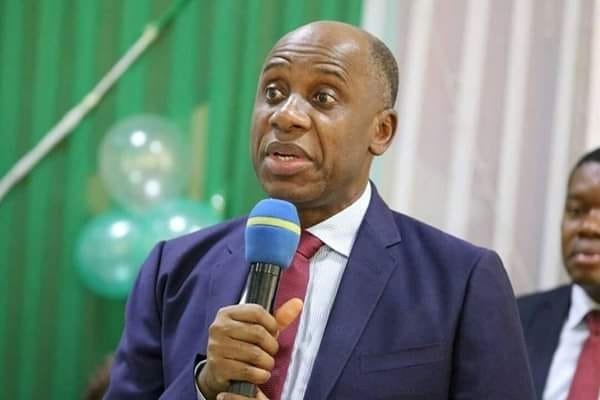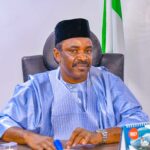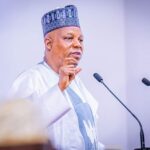It was a mixed grill for the transportation sector in 2021. The year has witnessed a beehive of activities in the sector, from the inauguration of new rail facilities via groundbreaking ceremonies to acquiring new security architecture to better police Nigeria’s maritime space, which was reputed as one of the most unsafe in the world. Our correspondent takes a look at the major events that shaped the transportation sector in 2021.
The year began on a high note for the transportation sector. On January 11, the federal government signed a memorandum of understanding with the Mota-Engil Group on the construction of a $1.959billion Kano-Maradi standard railway line.
The Minister of Transportation, Chibuike Rotimi Amaechi, signed the contract on behalf of the federal government, while the managing director of the company, Antonio Gvoea, signed on behalf of the contracting firm.
The new railway corridor, which is to be located in northern Nigeria, is to run through three states: Kano, Jigawa, and Katsina and through Niger territory, as far as Maradi. Other cities that will be affected by the rail line in Nigeria are Danbatta, Kazaure, Daura, Mashi, Katsina and Jibiya.
The 283.750-kilometre rail line, besides developing freight and passenger transport, as it will be integrated with road transport, will make a great contribution to the local economy, as well as an important development in the social sector. The project duration is 36 months, and the contract type is engineering, procurement, and construction.
This project dominated conversations throughout the year. Some Nigerians were miffed about the idea of Nigeria building rail infrastructure in Niger Republic when major cities in Nigeria haven’t been connected to modern rail infrastructure. Even some legislators kicked against the idea, especially when the federal government announced that it was rehabilitating the Port Harcourt to Maiduguri narrow-gauge rail facility and not a standard gauge project like the one proposed for Niger Republic.
In spite the huge resistance to the project, the federal government defended its position, arguing that the facility would unlock economic opportunities for Nigeria when Niger ships its goods from Nigerian ports rather than seaports of other West African countries as is currently the case. The federal government reckoned that with the proximity of Niger to Nigeria, the country should dominate its economy, adding that it was just 22km of the rail facility that extended into Niger Republic.
President Muhammadu Buhari went ahead to perform the groundbreaking ceremony in Katsina on February 9. However, 11 months into that ceremony, nothing significant has happened on that project.
Against the South-East and South-South rejection of a rehabilitated rail facility, President Buhari flagged off the rehabilitation of the Port Harcourt-Maiduguri (eastern line) narrow-gauge rail line on March 9.
The eastern corridor, which is a narrow-gauge rail track, as opposed to the standard gauge on the South-West to North-West, stretches from Port Harcourt through South-East, Middle Belt, North-East, and terminates at Maiduguri.
The government also approved the redirecting of the eastern line to two new spurs, namely, Abakaliki, Ebonyi State and Awka, Anambra State. It was awarded to Messrs China Civil Engineering and Construction Company (CCECC) and is to cost about $3.2billion. This 2,044-km eastern rail corridor connects 12 states.
The federal government would later approve the Lagos-Calabar coastal rail project, which is a standard gauge facility, in response to the concerns raised by the South-South and South-East.
Another major rail project that has added colour and contributed to how Nigerians commute is the Lagos-Ibadan project. The project, which had been under construction for about 4 years, came to a close with President Buhari commissioning it on June 10, 2021.
The president flagged off the Lagos-Ibadan railway operations and restated commitment to revamping the system.
At the event, Buhari promised that his administration would continue to prioritise the railway system as a transportation backbone that could transform industrial and economic activities in the country.
He described the launch as “another milestone in the drive of this administration to revitalise the railway system and establish it as a choice mode of transportation for both passengers and freight.”
The $1.5bn facility traverses Lagos through Ogun State, to Ibadan, the Oyo State capital, and is about 157 kilometres.
Also in June, President Buhari performed the groundbreaking ceremony of the Kano-Kaduna standard gauge railway, valued at $1.2bn, to be executed by the CCECC.
Because Nigeria now has huge investments in railway infrastructure, the federal government is also taking steps to develop the manpower that would run the facilities, even when the Chinese contractors hand them over.
The government has been sending young engineering students on scholarship abroad to learn railway technology. This is in addition to the transportation university that is being built in Daura, Katsina State. The president performed the groundbreaking ceremony in December 2019.
Minister Amaechi also disclosed that additional 300 young Nigerians would be sent to Portugal to train in railway technology, adding that these were in addition to 300 students being trained in China on railway engineering.
He said the training was to ensure the sustainability of the projects after they are delivered by foreign contractors.
“When Nigerians ask of our plans for sustainability and maintenance of these projects, my response is, ‘transfer of technology. The Chinese cannot just come here and dump the technology on us. We insisted that they create a transportation university for us. We told them that for five years they would hire lecturers who would train our people to take over from them. And that is what we are doing in Daura, Katsina State,” the minister explained.
Another milestone was the deployment of e-ticketing on the Abuja-Kaduna train corridor to end the culture of racketeering that has characterised that service.
Within the year too, the unthinkable happened on the Abuja-Kaduna rail line: the track was bombed at least twice within 48 hours. The bombs ripped off a section of the track and caused the train services to be halted for about three days. The attacks occurred around Rijana and Dutse in Kaduna State, the Nigerian Railway Corporation confirmed.
Shortly after that event, the NRC workers’ unions grounded train operations across the country in a three-day warning strike over poor remuneration.
Train operations across the country grounded as the railway unions embarked on a three-day strike action. The industrial action was to protest poor salaries and other perks of office.
Our correspondent reports that the Abuja-Kaduna train service was equally grounded as commuters were seen returning home.
The railway unions and the management of the NRC have held a series of meetings that yielded no meaningful results. One of such meetings with Minister Amaechi ended in a deadlock.
In the maritime sector, one of the biggest events that happened in the year was the inauguration of the Deep Blue Sea project in June.
The project is the Integrated National Security and Waterways Protection Infrastructure in Nigeria (also called the Deep Blue Project) at the ENL terminal, Apapa Port, Lagos.
The president said the flag-off was an important step in the strategic action about regional maritime security.
‘‘It will serve as a benchmark for member states in the Gulf of Guinea and other relevant stakeholders to further develop innovative strategies and align efforts with the subsisting framework to improve maritime security in the region,” he said.
He added that the new maritime security assets were coming at a critical time when the global discourse now revolves around piracy activities and the new dimension it has taken in the region.
The project, which was initiated by the Federal Ministry of Transportation and the Ministry of Defence, is being implemented by the Nigerian Maritime Administration and Safety Agency (NIMASA).
The main objective of the Deep Blue Project is to secure Nigerian waters, up to the Gulf of Guinea. The project has three categories of platforms to tackle maritime security on land, sea and air.
The land assets include command, control, communication, computer and intelligence centre (C4i) and data collection; 16 armored vehicles for coastal patrol and 600 specially trained troops for interdiction, known as maritime security unit. The sea assets include two special mission vessels and 17 fast interceptor boats. The air assets comprise two special mission aircraft for the surveillance of the country’s Exclusive Economic Zone (EEZ); three special mission helicopters for search and rescue operations, and four unmanned aerial vehicles.
Also, within the maritime space, President Buhari approved the suspension and later, sack of the erstwhile managing director of the Nigerian Ports Authority (NPA), Hadiza Bala Usman, over an alleged financial impropriety.
Also, within the year, the tenure of the immediate past executive secretary of the Nigerian Shippers Council, Mr Hassan Bello, ended and the president appointed Mr Emmanuel Jime to replace him.

 Join Daily Trust WhatsApp Community For Quick Access To News and Happenings Around You.
Join Daily Trust WhatsApp Community For Quick Access To News and Happenings Around You.



